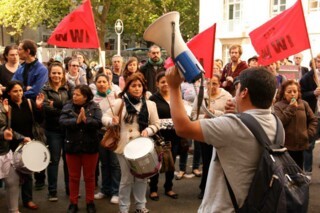Miembros No Números
Harry Stopes
There are a few hundred outsourced workers at Senate House and other University of London buildings in Bloomsbury, including the intercollegiate student halls. Most of the caterers are employed by Aramark; the cleaners, security guards and maintenance by Balfour Beatty Workplace, the services arm of the construction giant. Most are immigrants; from Asia, Africa, Eastern Europe and, overwhelmingly in the case of the cleaners, Latin America.
Two years ago the cleaners were being paid £6.15 an hour, and only 18 outsourced workers were members of the trade union, Unison Senate House Branch. A group of activists, working with the branch education representative, began free English classes sponsored by the union, together with a recruitment drive. In July 2011 they started a campaign for the London Living Wage, and in September 2011 held an unofficial strike demanding overdue wages; Balfour Beatty paid out around £6000 within three days. Wages have gone up four times since October 2011; the cleaners are now paid £8.55 an hour.
Union recruitment soared: up to a third of Branch members, including some of its most active organisers, were outsourced workers – unprecendented for a group that is traditionally among the lowest paid, most vulnerable and most difficult to organise. Last September the cleaners launched a new campaign for 3 Cosas: sick pay, pensions and holidays on the same terms as directly employed university staff.
But the Union management and branch leadership have not been helpful, to put it mildly. The then branch chair tried unsuccessfully to block a committee vote to increase funding for the Living Wage campaign. The vice-chair, Simon Meredith, and secretary, Josephine Grahl, wouldn’t hold a vote on giving official support to the 3 Cosas campaign, and tried to co-opt the agenda with a campaign run by Unison management rather than by the cleaners. ‘All our resources were going into fighting our own Union, instead of the campaign,’ an activist told me.
Seven committee positions on the Senate House Branch were up for election in late February. The outsourced workers and their supporters put up six candidates. Henry Chango Lopez, a porter, stood for international officer, and Sonia Chura, a cleaner, for vice chair. It was the first time that outsourced immigrant workers had stood for leadership positions at the branch.
In the past, elections have been held by a show of hands at the branch AGM, a practice which was set to continue this year, according to an email Grahl sent to Unison members on the 9 January and a blog postthe following day. But they later decided, without giving an explanation, to hold a postal ballot instead. Activists say that Unison management made no effort to ensure they had up-to-date details for members, some of whom – outsourced workers in particular – live precariously in rented accommodation and often change address. At least 28 cleaners did not receive ballots when they should have done, and another eight never received them at all, despite phoning Unison to ask for them.
Nearly three weeks went by without the results being announced. Then on 26 March, Unison declared the election void, citing the distorting influence of an article in the London Student and the fact that more than 10 per cent of ballots had to be reissued (whose fault was that?). They refused to release the results.
The next day, cleaners gathered for a demonstration outside Unison headquarters on Euston Road with drums and placards:
My boss respects me more than my ‘union’ does
They want our money but not our votes
¡Somos miembros no números!
When the crowd moved towards the building and tried to go in, security guards rushed to hold shut the revolving doors before locking them. A member of staff took photos through the glass. The police were called.
The impasse and the hostility from Unison are genuinely mystifying. A trade union using force to keep its dues-paying members out of its headquarters? A trade union trying to minimise or co-opt the self-organised campaigns of its members, and apparently trying to fix and then cancelling outright a democratic election? A Unison spokesperson told me the dispute was an ‘internal matter’ and declined to comment.
At a meeting last weekend, the cleaners voted to leave Unison and set up a new Senate House branch of the recently revived Industrial Workers of Great Britain. Most of the members will probably be outsourced workers, but directly employed staff will also be eligible; a few say they will join. It looks like a risky move by 3 Cosas. The IWGB is tiny, an offshoot of the IWW barely more than six months old, and possibly carrying baggage from the split. They also don’t offer the weight and protection of a large mainstream union. Then again, the cleaners have made whatever gains they’ve made so far without much help from Unison. They’ll be protesting outside Senate House at one o’clock tomorrow.

Comments